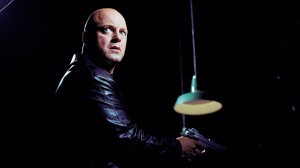
Like Galactus moving onto Venus after finding a Kilimanjaro-sized hair in his terrestrial supper, my unending need to feed on great television has been sidetracked by some missing Deadwood discs. While that gave my tongue an excuse to try out some new, Milch-ian diction when cursing my fate, it left my teeth eager to find a quality show to gnaw on. I decided to jump genres, and centuries, and crack into The Shield, which turned out to be a bit of a historical exercise all the same, just one that required looking sideways, as well as backwards. I’m an avowed fan of many of The Shield’s contemporaries, and some of the subsequent shows that have owed a lot to it, so I figured diligence was due in seeing how much a product of nascent 21st century TV The Shield was. The answer: almost too much, at least to begin with.
Were they not separated by mere months when premiering in 2002, you could view The Shield as FX’s answer to The Wire, or vice versa. Both are stealth shows, social critiques hidden under policeman blues, crime jargon, and a whole lot of dead bodies. Or you could see it as being the show that proved the white male antihero could work on basic cable just as well as premium, after Tony Soprano further pushed what a protagonist could get away with will still being referred to as a protagonist (though even he owed a lot to ABC’s NYPD Blue’s Detective Sipowicz). And in terms of form, The Shield was a forbearer for half-serialized, half-procedural shows like Justified, and regularly used the one day=one episode structure of Hill Street Blues (which David Milch adopted for Deadwood a few years later).
The pedigree of the themes and tropes is rooted in the people who came up with them. The opening credits for most episodes read like a murderers row of cable talent that would come into its own during, and after The Shield’s seven year run. Creator and showrunner Shawn Ryan was the mastermind for the whole operation, as many of the character types and writing quirks that came to define The Shield would also appear in various permutations across the shows he tried to followed it up with. Joining him were the likes of Glen Mazzara (who worked with Ryan on Nash Bridges, and had a brief stint running/saving The Walking Dead, only to get quickly fired for doing so), and Kurt Sutter (the creator and showrunner of Sons of Anarchy, who outdoes Ryan in ability to make clear his work is his work), in addition to a stable of writers and directors who went on to get involved in The Wire, 24, and Homeland.
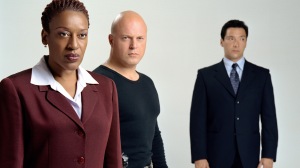
As Alan Sepinwall writes in his excellent “The Revolution Was Televised,” The Shield was one of the shows on the forefront of television’s Golden Age, but among the few pioneers on basic cable. That meant it had looser restrictions on content, but was still beholden to the all-mighty advertising dollars at FX. Seeing as it was caught halfway between network reproducibility and premium cable ambition, the mix of long form and short form stories, diverse (but still predominantly white) casting, and intense but-not-to-the-point-of-letting-people-say-fuck content made the show stand out, while still operating under the most familiar banner of programming out there: the cop show.
Michael Chiklis stars as Vic Mackey, a corrupt cop who’s the right combination of smart and ruthless needed to maintain order in L.A.’s volatile Farmington district, though it means that the letter, language, and legality of the law is left at home most days (where it can be invaded without a warrant and planted with drugs). Mackey is the leader of a similarly Machiavellian Strike Team that acts as the tip of the experimental department’s spear, targeting the big street players causing trouble, while the rest of the force (who work out of a repurposed church nicknamed The Barn) respond to murders and try to keep peace. Thanks to friends in high places who often need a guy like him, Mackey sees himself as a “different kind of cop,” a description from the pilot that doubled as the show’s way of telling viewers it wasn’t going to be your average police procedural.
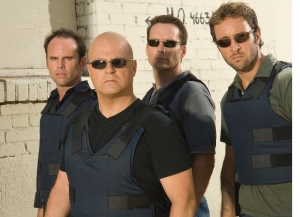
Yet, from the perspective of someone who’s already watched television’s Great American Novel, a number of gut-wrenching morality plays, and even some truly great genre fiction, going back to a cop show can be a little difficult at first, no matter how different it might be. When comparing first years, The Wire offers a far more textured and complex look at law enforcement, and that was back when the show was at its simplest. Meanwhile, Vic Mackey quickly stole Tony Sopranos’ title as the ur-WMA, with the split between his idyllic, family-loving home life, and morally reprehensible actions in the line of duty, laid on pretty thick in the early goings. It’s perhaps the point: when you introduce your main character as someone willing to shoot another cop in the face for being a snitch, the only place for your opinion of the protagonist to go is up, right?
But even at a story level, the ambitious episode structure would often strain when trying to craft an A, B, and C plot that could not only get wrapped up in 24-hours, but also build around, and within one another. The plotting in season one would skip over large chunks of time while following the same character, instead of flowing into a different story to cover the gap, and the season as a whole doesn’t develop much of an arc beyond a two-part finale. The 13 episodes divide their attention across seven or eight main characters, but Mackey is the show’s nasty catalyst for mayhem, as his sometimes well-intentioned, sometimes purely self-serving actions inevitably harm those in his personal and professional life.
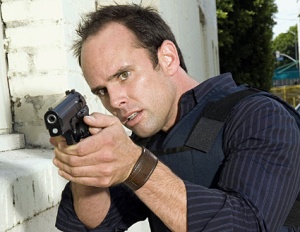
That’s arguably the biggest thing separating The Shield from its half-sibling The Wire though, because the latter treated its characters with about as much concern and investment as a burner phone (which is an important part of the thematic consistency: it’s not about the people, it’s the institutions). Meanwhile, The Shield spends a lot of its first year molding its characters into set archetypes (the idealistic rookie, the hardnosed older detective, the pissed off captain), and then starts gently nudging them out of the comfort zone. Mackey is the main point of interest, but we also develop a better understanding of his family, the varied alpha bros on his team, and many of the detectives, uniforms, and administration workers at The Barn.
Those investments over the first season really come to bare fruit in the superior second, to the point that you could argue the first season was intentionally held back from greatness, because the show in the long view (thus far) has been very much about trying to change for the better. Perhaps Ryan and company were initially worried that the bleakness of their vision wouldn’t find an audience unless it was easily digestible in other ways, so the really ambitious stuff had to be restrained until it was clear viewers wanted to go to some new places. When the show turned out to be a hit, the writers were freed up to really start fleshing out the stories and world of Farmington, turning it into something more than just a meat grinder that spits out a corpse or two each week.
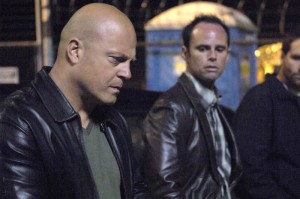
You get that sense from the first scene of season two, which opens not on Mackey, but Amardillo, a devious and savage Mexican gangbanger who styles himself the conquering hero of Farmington, uniting the disparate Latino factions under a single banner. The show had already established Farmington as a hotbed for over-achieving psychos and serial killers, but they usually disappear by the end of the episode; Armadillo is the first instance of an ongoing threat to Mackey’s team that doesn’t originate from inside the department, and the season is largely built around the new kid being the year’s big bad, a concept then-producer James Manos Jr. made an entire show out of with Dexter three years later.
While Mackey and Armadillo butt heads and burn faces, the Strike Team spends months prepping to takedown an Armenian money trafficking operation that could make the rest of their lives very comfortable, if all goes according to plan. Back at the Barn, the other cops face recurring problems based on rank, sexual orientation, and race (gender is a far subtler divide, as many of the best cops on the force are women, but undercurrents of patriarchal thinking still remain). All the characters start to break out of their initial stock roles in the second season, becoming more complex, and more human. The Shield can be genuinely horrifying in its portrayal of gore and sexual violence, but it’s always shown with purpose and consequence, because it’s through the characters trying to understand, and stop such horrible acts that the thematic aspirations of the show really start to take form.
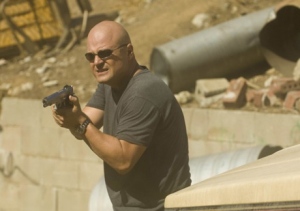
The inhabitants of The Barn are fighting against the worst, most terrifying impulses that people are capable of, and wind up compromising themselves for doing so. Mackey’s duty is to save lives and stop crimes, and he’s found that his ends frequently justify the means. That’s discounting how often he’s nearly arrested or killed most weeks because of these tactics, but if it keeps the peace, he can sleep at night (especially if doing so helps his struggling family sleep just as comfortably). More concerning than individual corruption is how law enforcement as an institution is built to accommodate acceptance of loose morals. The blue wall of brotherhood amongst cops is shown as a pillar of strength for those on the front lines, but that same comradery leads to habitual abuse of power, directed against suspects, uncooperative citizens, even cops who don’t fall in line. Even that bond ultimately has a breaking point: in one of the season’s best turns, Mackey’s solution to his escalating Armadillo problem comes from backstabbing a fellow officer out of their career.
Whereas season one was guilty of speechifying to make a point, season two is much better at letting the show's themes be explored through both the cleverly constructed weekly cases, and Mackey’s continuing failure to climb out of the muck once and for all. You could fault it for goosing the realistic frequency with which small errors and happenstance cause Mackey et al. to be backed into a corner, but television is all about seeing what happens when you throw characters into the deep end without warning. Each week wrings finger nail-destroying tension out of high stakes scenarios dramatic enough to entertain, but not stretch plausibility into the realm of pure fiction. Vick Mackey probably doesn’t walk the beat in your district, but the threats to his moral integrity almost certainly do. Those ideas are more directly expanded upon in shows that have followed in The Shield’s footsteps, but few have been able to do so while being this engaging week to week.
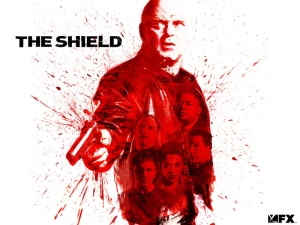
And I’ve still got five seasons left to go. Honestly, I chose this show as my next meal in a vain attempt to find a new source of whatever magic Ryan was cooking with when he made Terriers (one of his criminally short-lived follow-ups), but also because The Shield is credited with having one of the finest series finales ever made (unemployment gives you time to consider the 88th hour of a program worth the preceding 87). While I enjoyed the first season, The Shield in its second year is more inline with the reputation that has followed it in the five years it’s been off the air. Will it turn out to be the runt of the Golden Age litter? Maybe, but even ignoring the handicap of “historical curiosity,” episodes of The Shield still manage to surprise me even ten years past their air date. Here’s hoping season three keeps up that pace.

